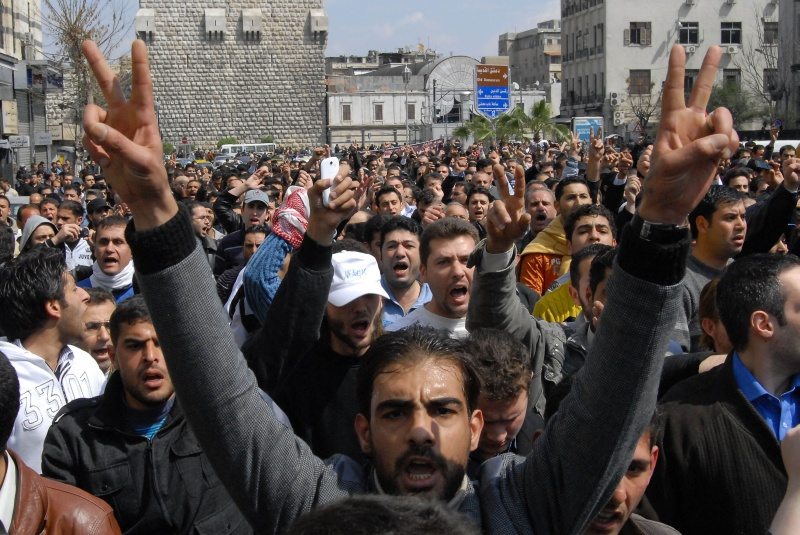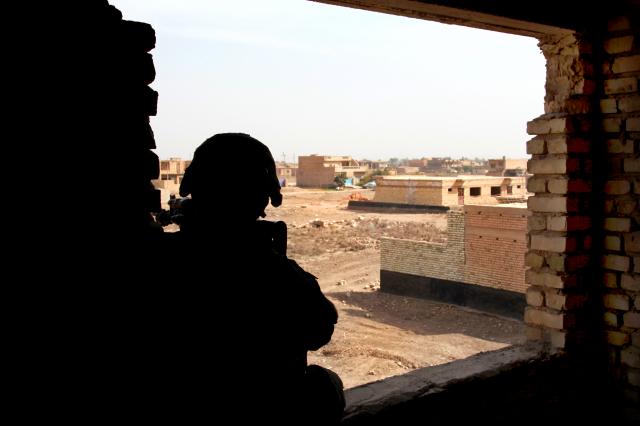The Arab League chief said on Monday that snipers remain a threat to civilian lives in Syria and called for the shootings to end, as activists heaped criticism on the bloc’s observer mission.
But Nabil al-Arabi defended the monitors in his first remarks since they were deployed in Syria a week ago, saying the “mission needs more time.”
“There are still snipers and gunfire. There must be a total halt to the gunfire,” Arabi said, even as monitors strive to stem the persistent bloodshed.
The issue would be raised with the government of President Bashar al-Assad, he told reporters in Cairo, “because the aim is to stop the shooting and protect civilians.”
But “it is difficult to say who is firing on whom,” Arabi added.
On the ground, 11 more civilians were killed by security force gunfire on Monday, while mutinous soldiers attacked three positions of the regular army, a watchdog and activists said.
After weeks of stalling, Syria agreed last month to allow the deployment of observers as part of an Arab roadmap calling for the withdrawal of the military from cities and residential districts, a halt to violence against civilians and the release of detainees.
The mission has been mired in controversy since a first team of 50 observers arrived on December 26, with activists and commentators saying Syrian authorities were keeping the monitors on a short leash and critical of the choice of a former top Sudanese military commander to head the operation.
On Sunday, the Arab Parliament, an advisory body of the 22-member Arab League, intensified the pressure saying the monitors should be immediately withdrawn having failed to halt the government’s crackdown on dissent.
“We are seeing an increase in violence, more people are being killed including children… and all this in the presence of Arab League monitors, which has angered the Arab people,” said the body’s speaker, Salem al-Diqbassi.
He urged Arabi to “immediately pull out the Arab observers, considering the continued killing of innocent civilians by the Syrian regime.”
In his response, the League chief said Diqbassi’s comments were an “important statement.”
Arab foreign ministers could meet as early as next week to review a report expected to be submitted later this week by the mission’s chief and to consider Diqbassi’s remarks, Arabi said.
But he stressed the League would not back down from the mission and would be sending more observers soon.
“We have 70 observers in six cities who carried out 26 missions (so far). Thirty more monitors will join them within days,” Arabi said.
He also revealed Damascus promised to allow foreign journalists into Syria to cover the unrest, “with the exception of three television stations.”
Arabi did not identify the networks but an Arab League official said on condition of anonymity they were Al-Arabiya, Al-Jazeera and France 24.
The head of the observer mission, Sudanese General Mohammed Ahmed Mustafa al-Dabi, is due to send his “first report in the next two days” on the situation in Syria, Arabi said.
“An Arab foreign minister has asked that a ministerial meeting be convened to discuss the report,” he added.
The Syrian Observatory for Human Rights said security forces on Monday killed five civilians in the central city of Homs, including a 10-year-old girl.
Five more were killed in the town of Douma near Damascus, four in security force search operations and one in a nearby village at the hands of pro-government militia, the Britain-based watchdog said.
An 11th civilian was killed at a roadblock in Idlib province in the northwest, close to the border with Turkey, the Observatory said in a statement received by AFP in Nicosia.
The Local Coordination Committees, which organise protests on the ground, charged that 390 civilians, including 30 children, have been killed since the monitors arrived in Syria.
A seven-year-old boy described by activists as the “first victim of 2012” died on Sunday along with four other civilians marking a brutal start to the New Year.
The Saudi-owned Al-Hayat newspaper published a blistering editorial on Monday criticising the Arab League for choosing the veteran Sudanese officer to head the mission.
Dabi “belongs to an army that has carried out war crimes in Darfur. Amnesty International holds him responsible for the arbitrary arrests and torture of many people in Sudan,” it said.
Dabi has disputed a YouTube video footage showing an Arab monitor accusing Syrian authorities of posting snipers on rooftops and demanding their removal, saying the remarks were hypothetical.
A controversial figure because he served under Sudan’s President Omar al-Bashir, who is wanted by the International Criminal Court for alleged war crimes, Dabi also ruffled feathers saying last week Syrian authorities were cooperating with the mission.
Israel’s Defence Minister Ehud Barak predicted on Monday that “the Assad family has no more than a few weeks to remain in control in Syria.”











